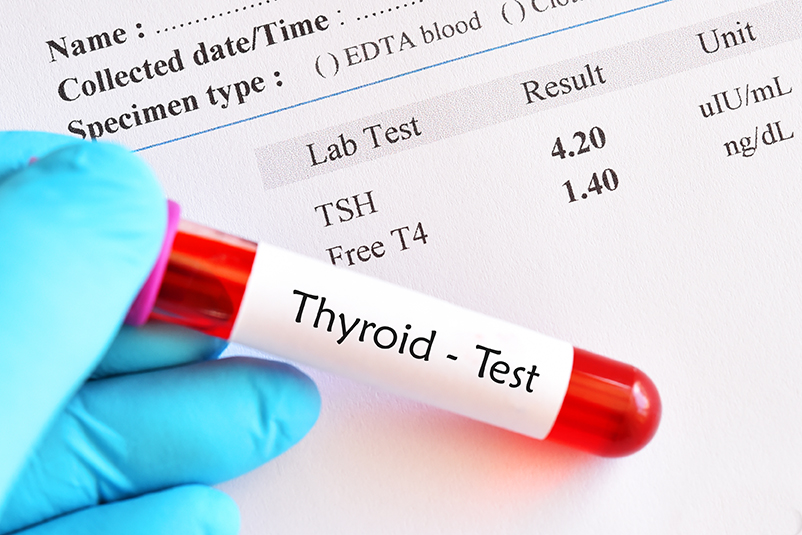What are thyroid functions and why are they done?
Endocrinologists and general practitioners refer a person to undergo a group of blood tests that are called thyroid function tests. These tests are prescribed when a person exhibits symptoms of thyroid problems. Generally, people exhibiting symptoms of hypothyroidism, hyperthyroidism, and pregnant women are prescribed thyroid function tests. In the case of pregnant women, these tests are specific to the trimester they are in.
What do thyroid function tests include?
The group of blood tests that form the thyroid function tests or the thyroid profile include:
- TSH – Thyroid stimulating hormone
- T4 – Thyroxine
- T3 – Triiodothyronine
- Free T3 & T4
TSH Test (thyroid stimulating hormone test)
This test is done to determine TSH levels present in the bloodstream. By assessing the levels of thyroid stimulating hormone, endocrinologists determine the functioning of the thyroid glands. This test is done by taking a sample of venous blood.
Thyroid stimulating hormone is produced in the pituitary glands. This hormone stimulates thyroid glands to produce T3 and T4. TSH levels, and T3 and T4 are interdependent. As the pituitary gland senses that the levels of T3 and T4 are less, it prompts the release of TSH. When the levels are on the higher side, the pituitary glands triggers reduction in secretion of TSH.
Because of this dynamic mechanism, TSH levels determine the functioning of thyroid glands.
What do the results of TSH test mean?
Having a higher TSH level means that the thyroid gland is not functioning properly. That is why the pituitary gland is secreting more TSH in order to compensate. This condition is called hypothyroidism.
Having a lower TSH level means that the thyroid gland is secreting T3 and T4 in excess. That is why the pituitary gland has reduced the secretion of TSH. This condition is called hyperthyroidism.
TSH Test range
| Normal | 0.4 mU/L to 4 mU/L |
| Underactive thyroid | Higher than 4mU/L |
| Over active thyroid | Less than 0.4 mU/L |
T4 & Free T4 (FT4) Test
T4 or thyroxine is a hormone that occurs in two forms. In the first form, it binds itself to proteins, and in another form (Free T4), it flows through the bloodstream and enters the tissues. By measuring the levels of T4 and FT4, endocrinologists determine the functioning of the thyroid glands.
What do the test results mean?
With tests like T4, FT4, or Free T4 index, many thyroid problems, and pituitary gland problems are evaluated by endocrinologists. People with higher FreeT4 index, or FT4 with lower TSH levels are more likely to have hyperthyroidism. Lesser levels of FreeT4 index, or FT4 along with elevated TSH level is indicative of hypothyroidism.
T4 & Free T4 range
T4 and Free T4 levels are dependent upon age, gender, and medical history. The range of T4 and FT4 is dependent upon the method in which the test is done. However, a normal range is generally between 4.6 mcg/dL and 11.2 mcg/dL.
Also, the determination of range is a complex procedure that is done by a measurement known as thyroid hormone binding index.
T3 & Free T3 Test
T3 & Free T3 test measures the level of Triiodothyronine. It is done in order to determine the extent of hyperthyroidism. This is because people with hyperactive thyroid have higher levels of T3. However, T3 test does not play a vital role in the diagnosis of hypothyroidism.
T3 & Free T3 Test range
- T3: 80-180 ng/dL
- Free T3: 230-619 pg/d
Diagnosis of a hyperthyroidism is complex and depends upon the relative levels of TSH, Free T3, and T3.
Other Thyroid function tests
Depending upon the signs and symptoms of thyroid problems, endocrinologists may prescribe some other tests. These tests include:
- Thyroid antibody test – This test is done to evaluate autoimmune thyroid diseases like Hashimoto’s thyroiditis.
- Thyroglobulin Test – This test is done to diagnose thyroid cancer.
- Radioactive iodine uptake – This test is done to evaluate hypothyroidism and hyperthyroidism
- Thyroid scan – This test is done to diagnose thyroid cancer.
- Basal metabolic rate – Previously used as a gold standard for hypothyroidism
- Sleeping heart rate – A decrease signifies hypothyroidism
- Achilles reflex time – A decrease is an indicator of hypothyroidism
- Lipid profile test – An elevation may be due to hypothyroidism
- Creatine Kinase – Is increased in hypothyroidism












